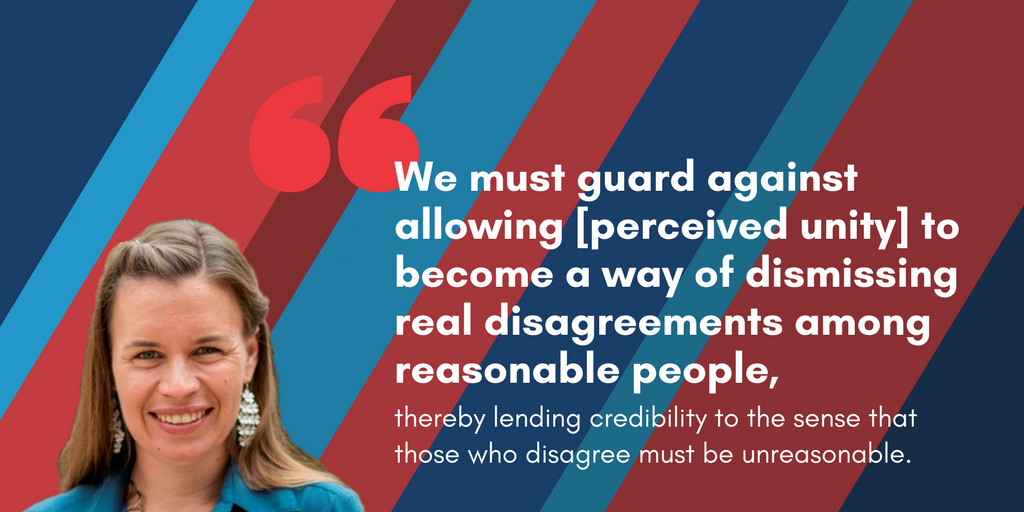Editor’s Note: Last week, the staff of Healthy Democracy attended the Frontiers of Democracy conference at Tufts University, sponsored by the Tisch College of Civic Life. At Healthy Democracy, we are actively nonpartisan and value inclusion of diverse political perspectives in conversations about democracy. Ashley Trim of the Davenport Institute (our partner on the California Citizens’ Initiative Review Demonstration) has allowed us to publish her talk on her experience as a conservative woman and an active participant in the fields of democratic innovation and deliberation.
When Peter invited me to offer a conservative perspective on the themes of the Frontiers of Democracy conference, I felt a little trepidation. 2017 is not the most fun time to be a young, female, conservative. I thought about jumping right in by reviving an argument I had with my Trump-voter relatives after the election about how Trump is actually a liberal. But I decided that level of provocation was worthy of Sam Adams, and if I’m going to invoke his ghost, I should wait till I’m settled in for a beer at the Green Dragon later this evening.
Seriously though, as I considered what I had to offer to the theme of this year’s conference, with its emphasis on the “global turn to authoritarianism,” I kept coming back to one issue that I suspected would not be covered elsewhere. And I hope it will be provocative – but in a way that is constructive for all of us. So. Here it is:
Authoritarianism comes in a variety of forms (on the right and the left). We would be remiss if we address authoritarianism in elected democracy but not in the civil institutions that underpin that democracy. Particularly our universities.
We would be remiss to spend three days talking about the challenges facing democracy without acknowledging the challenges to free speech that many American campuses are facing. Not only the student-led protests of Milo Yiannopoulos at seemingly every campus on the West Coast or Anne Coulter at Berkeley, but, more surprisingly, Charles Murray at Middlebury or Heather MacDonald at Claremont McKenna.
And these student-led challenges coincide with formal challenges from administrations in light of Title IX – I’ve had conversations with both liberal and conservative professors trying to navigate the ill-defined but ever expanding world of micro-aggressions and trigger warnings, well aware that tenure may not be the protection it was for their more radical predecessors in the ’60s and ’70s. As a woman who has a graduate degree and an administration-level job at a university, I am a fan of protections against discrimination. But I also live in a society facing difficult questions about both cultural and personal identity.
And in that society, we need our universities to be a place where conservatives can engage with liberals in philosophical and – dare I say – theological debates about the scope and limits of human choice, and where liberals can have honest and difficult conversations with each other about hard topics like what the rise of the transgender movement means for traditional feminism. We need to be able to have these conversations inside and outside the classroom without fear of repercussions.
If for no other reason, we need this because if universities aren’t leading this conversation, someone else will. And if those most likely to pick up the mantle are non-traditional media and political outsiders, it will not be a conversation but a shouting match.
So where do we go from here? I want to leave the group today with two challenges or charges that I hope will help us defend liberty on all fronts, in both our civil and formal democratic institutions.
My first challenge is this: We must work harder than ever in pursuit of a Confident Pluralism (to borrow from the title of a brilliant little book by John Inazu).
Was anyone else a little taken aback by the offerings for the Saturday plenary at this conference? Winning the Next Election, Winning the Next Election with a Different Coalition, Resisting the Administration in Institutional Settings, Resisting the Administration Outside Institutional Settings?
My first thought when I saw the list was: “Wow. If I had received this email 3 years ago, I would have assumed it came from the John Birch Society.” Apart from a lack of nuance, what struck me most was an implicit assumption of agreement in topics like “Winning the Next Election” or “Resisting the Administration.” I am not a fan of Trump. But I can guarantee that what “Winning the Next Election” looks like for me is very different than what it looks like for many of you.
I suspect that in many ways this exclusive framing is simply a result of silo-ization (and Conservatives bear our share of responsibility for why there are so few of us in a room like this one). My own social media feeds suggest that there are spaces where Conservatives can make the same types of assumptions, but as a conservative in academia I tend not to find myself in those places. I do however frequently find myself in the middle of a very well-intentioned conversation at a conference trying to figure out whether it’s worth it to admit that I’m not a huge fan of high-speed rail projects, or that I do think the immigration question is complicated by the regulatory state and the burden it places on small labor, or “oh yeah, actually, by the way, I think abortion is morally wrong.” (I am guessing these types of internal deliberations may also resonate for those who fall to the left of the mainstream).
The burden on me in these situations is to be a bold advocate of my own perspective. But the burden for those more in the “mainstream” of polite intellectual society is to be conscious of their own assumptions about the extent of agreement. Even if it were safe to assume no one in this room voted for Trump, it is unwise to do so. If there is someone here who voted for him, and who is still willing and able to come to this type of a convening, that is the person we need to hear from the most and we need to make it possible for him (or her) to speak up.
Which leads directly into my second challenge: We need to model disagreement.
A couple weeks ago I was in Salt Lake City at the annual conference for the University Network for Collaborative Governance. A colleague who teaches dispute resolution and collaborative problem solving shared his experience asking students to identify examples of distrust in case studies. He said that almost universally, these well-educated, thoughtful men and women instead identified examples of disagreement, and had a very difficult time distinguishing between the two. This should be concerning for anyone committed to democracy.
It can be tempting in times of perceived political crisis to emphasize that we agree more than we disagree. And that may be true. But we must guard against allowing that to become a way of dismissing real disagreements among reasonable people, thereby lending credibility to the sense that those who disagree must be unreasonable. History is full of examples where unity against a perceived crisis silenced much needed voices of dissent or caution – from the Reign of Terror to the War on Terror.
Disagreement is hard. It is difficult to grant credibility to someone whose conclusions we find untenable. Much easier to give into the temptation of demolishing a straw man than to seek genuine points of departure. It is easier for conservatives to accuse liberals of wanting to kill babies than to address the real stigmas of single parenthood and the crisis of children in foster care. On the other hand it is easier for liberals to accuse conservatives of wanting to subjugate women than to address the legitimate moral questions of how we define and prioritize life (particularly given the abortion rates of the unborn diagnosed with Down syndrome and other non-typical development).
It is easier to build a coalition around a solution to a simplified problem than it is to acknowledge that we may not have the answers to difficult problems. One of the best things I have encountered this year is a TEDx Talk by Megan Phelps Roper (formerly of Westboro Baptist Church). She describes her journey out of Westboro via a Twitter exchange, which she describes as, “full of genuine curiosity on both sides. How had the other come to such outrageous conclusions about the world?”
If we are honest with ourselves, most of us find it easier to dismiss the outrageous conclusions of others than to engage with them. One of the things Megan emphasizes is the need to “make the argument. . . We can’t expect others to spontaneously change their own minds.”
And when it comes right down to it, the other may not change their mind. We may change ours. Or we may continue to fundamentally disagree on foundational claims, on the comparative value of different arguments, on the appropriate prioritization of conflicting interests. But we will be far better equipped for deliberation, whatever our position on the political spectrum, with a far better awareness of when we are able to collaborate, when we are willing to compromise, and when – as will sometimes happen – we need to stand on principle. And if we can have these conversations with each other, then we can build trust even where there is disagreement, as we explore the frontiers of democracy.
Look for our reflections next week. You can also check out Peter Levine’s thoughts on the conference, including some of the issues raised by Ashley Trim.


